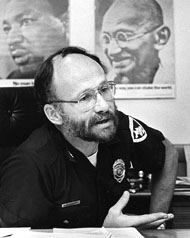“– a resentment and suspicion of the life of the mind and of those who are considered to represent it, and a disposition constantly to minimize the value of that life.”
This definition causes me to wonder and think about those police with whom I have worked with and led over the years; those who had a “resentment and suspicion of the life of the mind;” who constantly minimized the value of an education or intellectual life.
Those who held these beliefs were obstacles to the great vision of police a free society and defending the “inalienable” rights of its people.
It is very important for police leaders today to select the “best and brightest” in their communities to serve as police — and for them to be actively engaged in growing both the intellectual and emotional life of their officers.
This is important because today’s police need to be thinkers — now more than ever — thinkers who are able to creatively solve the problems of community support and trust which confront them today.
- When police are able to creatively think and solve the problems which confront them, they will not only improve their work, their relationships within the community, but also themselves.



I agree that anti-intellectualism is a problem in policing. Police leaders have a science blindness. There is a large body of science that informs us about various aspects of performance in police organization’s.
This phenomenon is related to the types of people attracted to policing and subsequently selected. When the “Big Five” personality factors are measured in police samples the lowest factor is openness to new experience.
Some of this anti-intellectualism is also related to the nature of higher education. Policing education in higher education should model medical education programs. It is rare to encounter police practitioners teaching at the university level. We need more officers to pursue terminal degrees and to teach.
LikeLike
Well said, Mark. Thanks for your insight!
LikeLike
The Soul; which is made up of the mind, the Will and the Emotions backed up with fear training and the Five Senses without a Heart of Compassion is a dangerous combination standing behind a loaded revolver.
LikeLike
That is so true!
LikeLike
Thanks…. but one portion we are missing is all of this is the fear factor. It may highten their attention but it makes them respond when there is no real danger but preceived danger they fire and find out later.
LikeLike
This can be overcome by high-quality, realistic training. Police have to know what a physical interaction is really like and control their fear. Some of us learned this on the street by trial and error — others of us learned this by becoming martial arts practitioners and approaching a “resistive arrest” situation almost surgically… (at least that’s what I did!).
LikeLike
Amen!
LikeLike
We should have police academies last for 3 years like they have in European countries like Sweden and Germany/ In addition, if the guy is moving up the ranks, he should be made to go back to the academy again for more thorough training. In Germany, if you are select to be a komissar (police inspector) if you do well on the examination, they send you back to the academy for another 2 to 3 years. If you are selected for the highest German police ranks, you are sent to the Federal Police Leadership Academy for one year of police study.
LikeLike
Sounds reasonable — we have little leadership training for police that approaches their needs.
LikeLike
“Policing education in higher education should model medical education programs.”
Mark, we should also base policing on teacher education programs considering the fact how much we demand from teachers in terms of acquiring a higher college degree, maintaining their teaching credentials, and doing things like doing research papers, writing books, etc.
LikeLike
A good idea!
LikeLike
Gunther you are right on.
Three to four years of police training is not reasonable for someone who truly wants to become a police officer and with basic on the job training or they will only have head knowledge.
Certifying and screening teachers and highter ranking officers would be a good ideal. Might help them to function better and not like our boys in Ottawa to keep their pants on and their hands off rear ends.
Putting university cadets beginning in their second year in different levels of police work, instead of taking holidays, might work good.
LikeLike
We should have police training also based on people who cut other people hair and do their nails as well. It is amazing how the hair style people and nail cutters have to go through to get their license and maintain them plus keeping their places clean than what the police officers do. When you become a cop, for the most part, it is like graduating from college/high school. You don’t have to do your homework anymore and you stop learning.
LikeLike
Gunther, apparently you have no idea what being a police officer involves. You never stop learning. Where I live you need continuing education constanley. So glad you can compare a hair stylist to a police officer, because the jobs are so close!
LikeLike
Unreal, the police departments in Europe knows far better than American cops do about what being a police officer entails. Why do you think that their officers get far more thorough training for a longer period of time at the academy and are held to high standards when it comes to dealing with the public. Until American police departments start to learn this, they will never learn about real policing.
LikeLike
Cops never stop learning? Here is an example of a police lieutenant not knowing his municipal laws and got school on it by the kids in the community and he look like he was about to take out his baton to club the kid.: https://www.rawstory.com/2016/03/watch-bmx-bike-rider-schools-ca-cop-by-knowing-the-real-law-not-the-bullsht-one-he-made-up/
LikeLike
What a nice case study. Run this situation by police recruits — having made a mistake, now what do you do to try and rebuild the relationship? It may be VERY important in the future. When the Lt. got pissed off and angry, he lost the day…
LikeLike
How about the famous or infamous case study in Baltimore where the cop got mad because the kid kept calling him dude and that cop had 19 years on the force. He obviously hadn’t learned any about community relationships for the last 19 years.
LikeLike
Unreal. Please explain to me how cops, hairstylist, and people who work on people’s nail are close to each other? People in the nail and hairstyling business don’t go to domestic violence situation, don’t work murder cases, don’t write tickets, etc. If they screw up on their customers, their customers won’t return and do business with them. You can’t say that with the police department.
LikeLike
Unreal, another thing about Europeans knowing about police work entails is because they have been there and done that regarding their experiences with the police because the police have been used to support all kinds of government: left wing, right wing, civilian dictatorship, military dictatorship, royal dictatorship, dictatorship by other countries (Poland was divided up by Prussia (Germany, Russia, and Austrian-Hungry, so they dealt with three different police forces), and finally colonial dictatorship (Ireland being under British rule). You can’t say that about America except that police still have not learned a thing about being held accountable for illegally spying on American citizens starting from the 1920s up to today. Name me one police chief, sheriff, state police chief, or FBI director who had the guts to say no I will not do what you politicians and businesses leaders asks me to do and resign in protest?
LikeLike
Yours truly… but I had tenure.
LikeLike
Unreal, you are somewhat right about cops never stop learning. They never stop learning about how to violate people’s rights despite court rulings against them. Here is an article from Alternet regarding drug-sniffing dogs: http://www.alternet.org/drugs/blatant-intrusion-drug-sniffing-dogs-may-be-coming-end
LikeLike